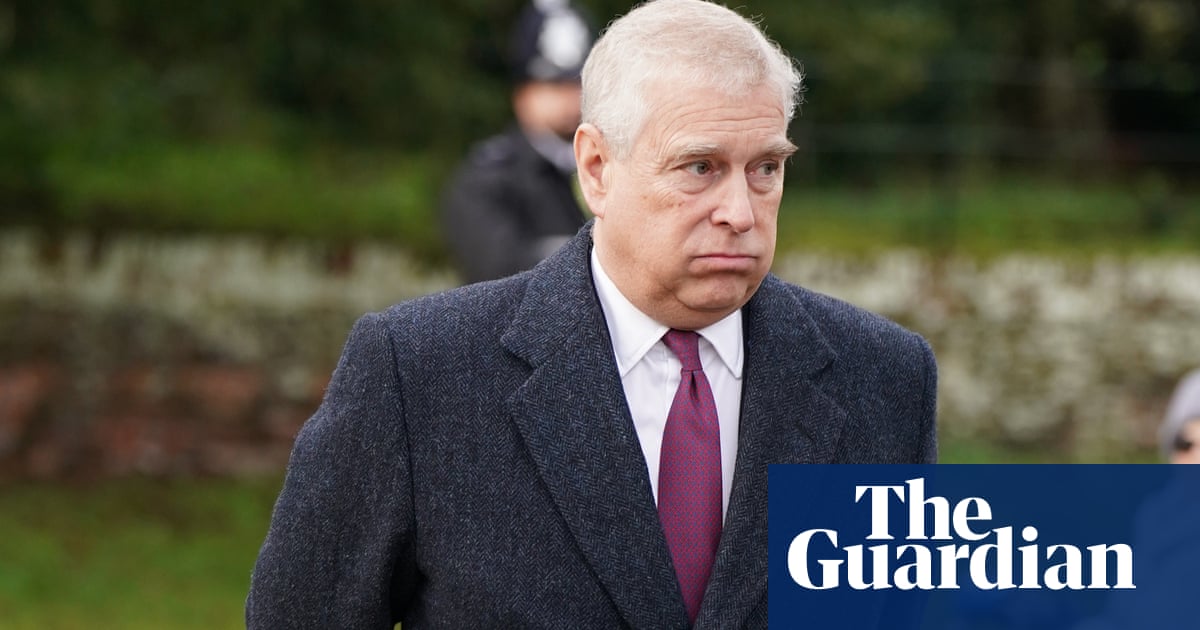Getting information from government departments about the Duke of York’s past business dealings is like playing “whack-a-mole”, it was claimed, as fallout over the alleged Chinese “spy” controversy continues, with China saying it was an attempt to “smear” it.
Calling for a register of royal interests, similar to that for MPs, and a full inquiry by the public accounts committee into royal finances, researchers trying to investigate Prince Andrew’s “opaque” finances claim their freedom of information (FoI) requests are regularly refused, making their work “impossible”.
The calls follow the naming of Yang Tengbo, 50, as the businessman and confidant of Prince Andrew who was excluded from the UK in 2023 on the grounds that it was “conducive to the public good”. Yang denies being a Chinese spy, and the Chinese embassy in London has accused some UK parliamentarians of having a “twisted mentality towards China” and of trying to “smear China”.
Also known as Christopher Yang, according to court documents the businessman was so close to Andrew he was authorised to act on his behalf in an international financial initiative with potential partners and investors in China.
As the spotlight falls again on the duke’s finances, Andrew Lownie, whose book Entitled: The Controversial Lives of the Duke and Duchess of York is out next year, said: “I’ve put in about 100 FoI requests over the last four years.”
The Guardian’s Cost of the Crown series attempts to shed light on royal finances, but there is no official mechanism for obtaining information, say critics.
Lownie said documents relating to Andrew’s decade as “special representative” for UK trade and investment, “when he was basically a public servant”, could reveal who went on his numerous overseas trips with him, who he met while on them, and what the purpose of them was.
Andrew stood down from that role in 2011 after criticism over his friendship with convicted sex offender Jeffrey Epstein. His former wife, Sarah Ferguson, admitted having accepted £15,000 from Epstein to pay off her debts.
The duke then started his Dragons’ Den-style Pitch@Palace entrepreneur scheme. While the UK non-profit arms Pitch@Palace CIC was dissolved in 2021 in the fallout of Andrew’s appearance on Newsnight, it has been reported that Pitch@Palace Global Ltd has significant cash reserves and is controlled by the Duke of York through a trust, remaining active. It has also been reported Andrew was entitled to receive a 2% share of any investment deal for three years.
Yang was the founding partner of Pitch@Palace China. The duke said in a statement he had ceased all contact when concerns were raised.
Lownie said of Andrew’s role as trade envoy: “He was a public servant, so therefore the files under the Public Records Act need to deposited in the Public Record Office after 20 years. But what’s happening is they are using a whole series of FoI exemptions to prevent any researcher from finding out what he was up to.”
“When I ask the Department for Business and Trade for records for his time as a public servant between 2001 and 2011, they claim they have no records until 2008. But they took several years to tell me this, and many requests.”
skip past newsletter promotionSign up to Headlines UK
Get the day’s headlines and highlights emailed direct to you every morning
after newsletter promotion
He said so many exemptions from the Freedom of Information Act were cited that “it’s like whack-a-mole, trying to phrase it. That’s why I am calling for a register of royal interests.”
Though as trade envoy Andrew did not receive a salary, only expenses and travel costs, the role allowed him to “harvest” contacts, said Lownie. In his last year as envoy, Andrew visited 15 countries and carried out 616 engagements, of which three-quarters were trade-related.
“These contacts are piggybacking off the work he was doing, in effect, as a civil servant. And they will say he is a royal, and by dint of the monarchy we can’t look at anything he did. But he wasn’t a royal when he did this job. He was appointed as, in effect, a public servant as a trade envoy.”
A DBT spokesperson said: “The department has complied with its obligations under the Freedom of Information Act and Public Records Act and maintains that information has been withheld in accordance with the Acts. This includes an ICO decision notice which outlined that the commissioner did not need to take any further steps.”
Interest in Andrew’s finances had sharpened when it was reported that King Charles was no longer paying him an allowance, raising questions about how he is able to pay for the upkeep of his home on the Windsor Estate, Royal Lodge, leased from the crown estates, and its reported £3m annual security costs.
Norman Baker, a former government minister and author of ... And What Do You Do? What The Royal Family Don’t Want You To Know, said a register of royal interests would provide accountability similar to MPs and members of the House of Lords.
“There’s been no formal mechanism for finding anything out at all. I suspect there is a whole lot more that needs to come out from his time as a trade envoy,” said Baker, whose new book on royal finances, Royal Mint, National Debt, is published next year. “Bear in mind he ended up buying a chalet in Switzerland. That didn’t come from his naval pension, did it?
But trying to get documents from the royal archives, “where there’s nothing released after 1952” and no register, he said, was “like throwing a dart when you’re blindfold”.
“There needs to be a full inquiry by the public accounts committee into royal finances,” he added.
